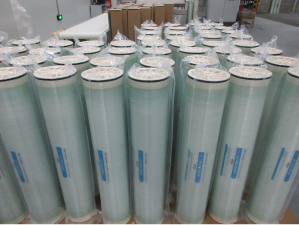Reverse osmosis (RO) is a widely used filtration technology that utilizes a semi-permeable membrane to remove impurities and purify water. In recent years, the application of reverse osmosis membranes has expanded beyond water treatment and has found its way into the food processing industry. This article explores the various applications of reverse osmosis membranes in food processing, highlighting their benefits and the improved quality they bring to the final products.

Concentration of Fruit Juices:
Reverse osmosis membranes are widely employed in the concentration of fruit juices during food processing. By applying pressure to the feed solution, water molecules are forced through the semi-permeable membrane, leaving behind a concentrated juice with enhanced flavor and nutritive properties. This process is advantageous as it allows for the removal of water without excessive heat, thereby preserving the aroma, taste, and sensitive bioactive compounds present in the fruit juice.
Desalination of Brine:
Food processors often encounter the challenge of dealing with brine, which is generated as a byproduct in various food manufacturing processes. Reverse osmosis membranes offer an effective solution for desalting brine. By utilizing the high-pressure-driven mechanism, these membranes remove the dissolved salts, minerals, and other contaminants from the brine, resulting in fresh water and a reduced-volume concentrated brine suitable for further processing or disposal.
Purification of Dairy Products:
The application of reverse osmosis membranes in the dairy industry has gained considerable attention. These membranes help in the purification of milk, whey, and other dairy products by selectively separating water, lactose, minerals, and other impurities. The purified components can then be further utilized in various dairy products such as cheese, yogurt, and butter, contributing to improved taste, texture, and quality.
Removal of Bitterness in Coffee:
Bitterness is a common undesirable attribute in coffee. Reverse osmosis membranes play a vital role in removing bitter compounds from coffee extract, resulting in a milder and more palatable brew. This process allows coffee manufacturers to produce high-quality, low-bitterness coffee while retaining the desired aroma and flavor compounds.
Clarification of Fruit and Vegetable Juices:
Reverse osmosis membranes are used for the clarification of fruit and vegetable juices, eliminating suspended solids, pectins, and other particles that can cause turbidity. The clarified juice not only appears visually appealing but also boasts improved stability, extended shelf-life, and enhanced flavor, making it more marketable to consumers.
Reverse osmosis membranes have found widespread application in the food processing industry, revolutionizing the way various products are manufactured. From concentration and desalination to purification and clarification, these membranes offer numerous advantages, including improved taste, nutrient retention, and extended shelf-life. As technology continues to advance, it is expected that reverse osmosis membranes will play an increasingly important role in ensuring high-quality food products for consumers worldwide.





 Language
Language




 Network Supported
Network Supported